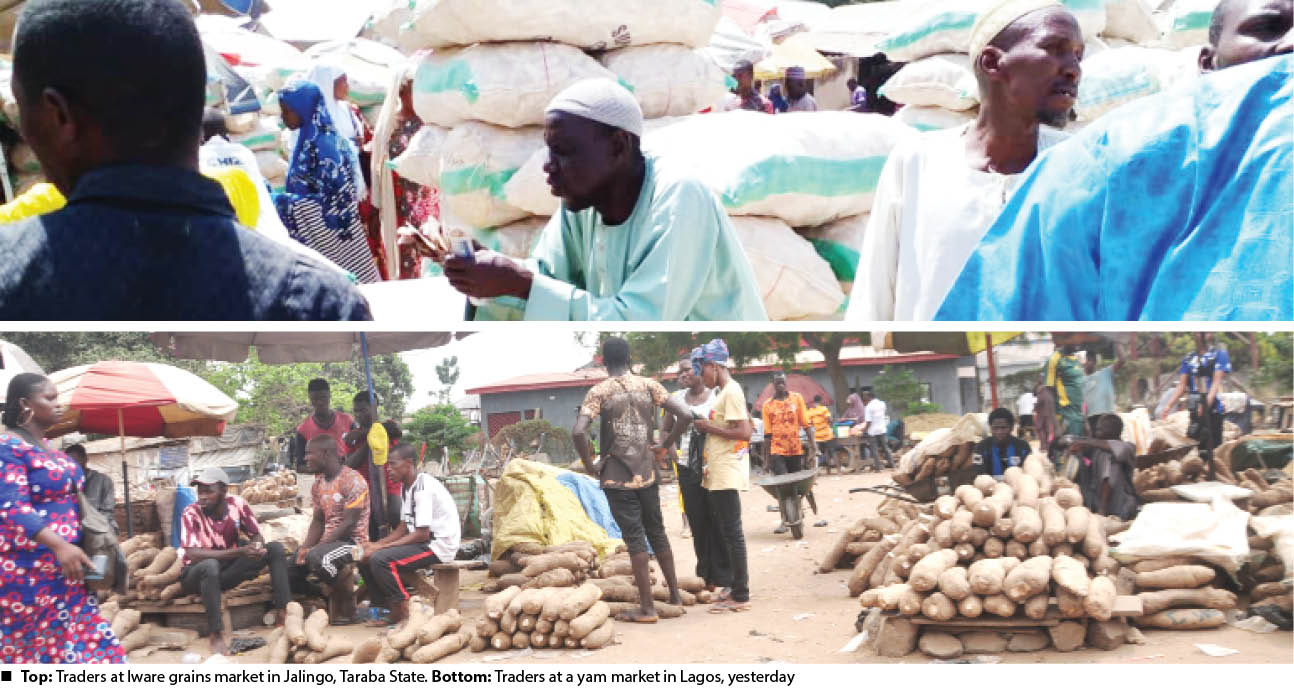The scarcity of both old and the new naira notes has forced traders across the country to slash prices of their goods, reports by our correspondents in states have revealed.
The worst hit, according to findings by our reporters are traders of grains, livestock and other food items. This is just as Point of Sale (PoS) operators are closing shops in droves over the scarcity of naira and failed online transfers by their customers due to the redesign of the N1,000, N500 and N200 notes by the Central Bank of Nigeria, CBN.
Daily Trust reports that Nigerians anticipate a relief following the Council of State meeting billed to hold today, where the governor of the CBN, Godwin Emefiele will be briefing the members that include former heads of state and presidents as well as state governors.
The president had asked for a seven-day window, which lapsed today, February 10, to resolve the currency crunch that had emanated from the implementation of the CBN policy to swap old notes with new ones after a meeting with the APC governors.
Old notes: Matawalle defends suit against FG, says critics are misguided
We allocate new notes to banks on daily basis — CBN
Markets in Kano suffer
At the Dawanau International Grains Market in Kano State, there has been a drastic drop in the prices of agro commodities as well as business activities in the market.
It was gathered that marketers were forced to adopt strategies that vary the prices of commodities depending on the mode of payment in the market.
A 100kg bag of maize sold at N22,000 last week is now selling at N14,000 with cash and N18,000 using bank transfer. A 100kg bag of millet sold at N25,000 last week is now selling at N15,000 cash and N18,000 using transfer and a 100kg of paddy rice is now N13,000 as against N23,000 sold last week.
According to a merchant at the market, Malam Inuwa Bello, grain marketers have been forced to meet up their demand by selling their goods even if it is at loss to keep body and soul together.
He said there has been a general reduction in commodity prices irrespective of the mode of payment due to cash scarcity.
At the Yankaba Perishable market, a basket of tomatoes sold at N8,500 last week is now selling at N4,000 with low patronage.
However, the case was different at the Singer Consumable market as prices of commodities sold there remain constant.

Prices of Irish, others crash in Jos
Reports showed that prices of tomatoes, Iris potatoes and other perishable goods have crashed in Jos and other markets in Plateau State.
At the Farin Gada market in Jos, a basket of tomatoes that was sold last week between N1,500 and N2,000 has crashed to N700 due to the scarcity of naira notes.
Also, in the Maikatako market, another popular Irish potato market in Bokkos LGA, the price of potatoes has crashed.
Hauwa’u Musa, a potato seller in the market said the price of the commodity was cheaper than before, saying “a 50kg of potato is N6,500 as against N10,000 sold last week”.
In Gombe State, a local merchant in Dukku LGA, Lukman Umar Mai Besha, said peasant farmers were adversely affected by the naira cash crunch.
He said, “In Jamari rural community, as of last Friday –being the market day a 100kg of millet was sold at N7,000 as against N20,000. Even at that price, many had to go back home with unsold produce.
“Maize was sold at N8,000- 10,000 with almost no buyers. And beans were sold at N19,000, which hitherto was sold at almost N40,000. The situation here is pathetic, almost all businesses have been affected by this cash scarcity.”
Lagos, Ogun Kwara traders record poor sales
In Lagos, our correspondent found that the naira crunch was biting harder. At the Alaba Rago market, there were low activities as most of the traders sat in groups discussing the inability of buyers to access cash.
Some traders blamed the poor sales on the inability of customers to access cash that would have enabled them to buy food items. A trader, Karrem Umar, said it diminished the purchasing power of customers.
Ahmadu Abdullahi who sells chicken, disclosed that one chicken that was sold for N10,000 in December and early January is now sold for N6000, yet there are no buyers.
A cross-section of traders in Oke-Aro, a border community between Lagos and Ogun state narrated their losses due to the ongoing naira scarcity.
Mrs Josephine Onwu who buys soup ingredients from the Agbado market and resells in the Oke-Aro community explained that prices of goods have not changed. She added however that the cost of transportation is a major problem.
Pepper and tomatoes seller, Mrs Abosede Lawal cried that her shop is almost empty and she has had to reduce the number of times she goes to the market.
A trader at the Mile One market, James Obinwa said he has witnessed low patronage since the scarcity of naira notes started.
In Kwara, a soya beans trader in Kaiama Local Government, Amina said the situation has left them with no choice but to stay at home.
Memuna, another grain seller at Kaiama said she has left the business for now as there is no revolving capital to keep the business, body and soul afloat. “Those super agents that do cash swap for us have run out of cash. We don’t even know what is happening again. We can’t survive anymore”, she added.
Mrs Salamat, a rice and beans merchant trader at Mandate Market in Ilorin said although they are not selling at a loss yet, the situation has not only stifled sales but has eaten deep into their gains and capital.
PoS attendants close shops, fear job loss
While the traders are counting their losses, thousands of Point of Sale (PoS) are closing shops over their inability to get cash to attend to customers’ needs.
According to our surveys, the past few weeks have seen a lot of reactions from citizens across Nigeria over the scarcity of the naira.
A cross-section of PoS operators interviewed in Kaduna, Kano, Anambra, Abuja, Lagos, Ogun and Plateau states, decried the situation, saying it has sent them out of business.
Aisha Ahmed, an operator of PoS in Chikun LGA of Kaduna State, said the situation has forced her to diversify her business.
In Kano, PoS operators also fear they could lose their jobs. Sani Aminu said that the operators now also face challenges with the issue of transfer where they find it difficult to receive the money.
Ibrahim Umar, a PoS vendor in Dukku, Gombe State said business is not as usual saying the erratic electronic transaction and never-ending network glitch are killing their business.
Experts dissect situation, as FG official lauds price crash
The price fall as a result of traders selling their wares at a loss is of concern to some experts. However, a senior presidency source has lauded the price crash saying it is capable of cutting down the high inflation rate.
A former Director General of the Nigerian Maritime Administration and Safety Agency, Dr Dakuku Peterside said: “The truth today is that we are in a crisis situation and how do we address it, CBN needs to sit with the banks and make sense of what is happening. With the populace, there must be a constant flow of information. That will build confidence, reduce anxiety, and remove uncertainty, which drives people to negative behaviour. Put institutional processes in place that will make it impossible for banks to abuse their powers and licence.”
Also commenting, the CEO, the Centre for the Promotion of Private Enterprise (CPPE), Dr Muda Yusuf said: “In managing liquidity in any system, it is not correct to dispossess people of their financial assets, which are fundamental.”
He said the restriction of people from getting cash should only happen when a bank is distressed and not as generic as caused by the naira redesign policy. “We need to make that distinction between dispossessing people and promoting a cashless objective.”
However, a senior official at the presidency who spoke in confidence believes the next inflation report will reveal a further downward trend from the over 20 per cent inflation rate.
“That prices of food products are crashing is good for the economy. Remember that the high inflation rate has been driven all this while by food inflation. Our economists have projected a decline in inflation this year and we are observing prices of food falling, then it means the naira redesign policy is working,” the official noted.
Emefiele, INEC chair brief Council of State today
Meanwhile, the governor of CBN, Godwin Emefiele, will today provide an update on the new currency redesign policy at the Council of State.
Also expected to speak on the level of preparedness for the 2023 general elections at the virtual meeting to be chaired by President Muhammadu Buhari at the Council Chambers of the Presidential Villa, Abuja, is the Chairman of the Independent National Electoral Commission (INEC), Professor Mahmood Yakubu.
The Inspector General of Police (IGP), Usman Alkali Baba, will equally brief on the preparation for the elections.
The National Council of State is an organ of the Nigerian government whose functions include advising the executive on policy making.
Presidency sources said the two major items in the notice sent out by the Secretary to the Government of the Federation, Boss Mustapha, apart from the adoption of the conclusions reached at the last meeting held on 14 April 2022 remained “State of preparedness for the 2023 general elections” and “update on the implementation of the new currency redesign policy.”
By Sunday M. Ogwu, Kamarudeen Ogundele, Simon E. Sunday, Dalhatu Liman, Muideen Olaniyi (Abuja), Eugene Agha, Yvonne Ugwuezuoha (Lagos), Victor Edozie (Port Harcourt), Mumini Abdulkareem (Ilorin), Ado A. Musa (Jos), Ibrahim M. Giginyu, Lubabatu Garba (Kano), Titus Eleweke (Awka) & Maryam Ahmadu-Suka (Kaduna)



